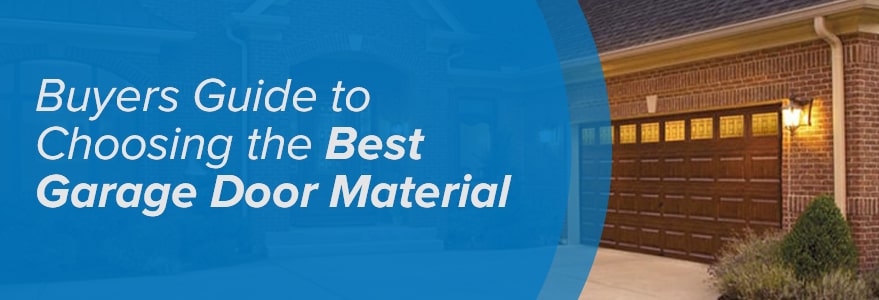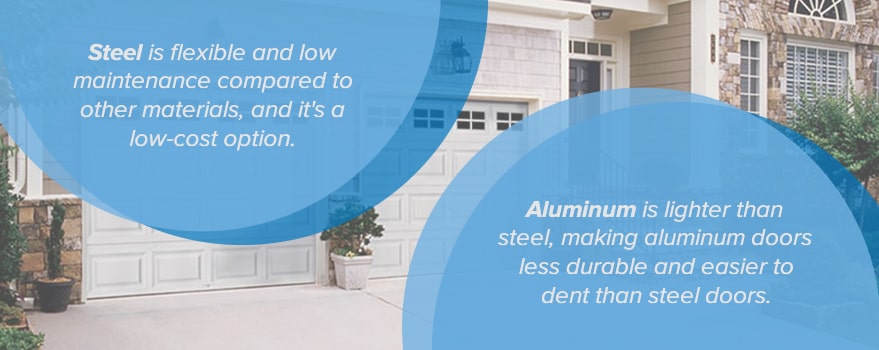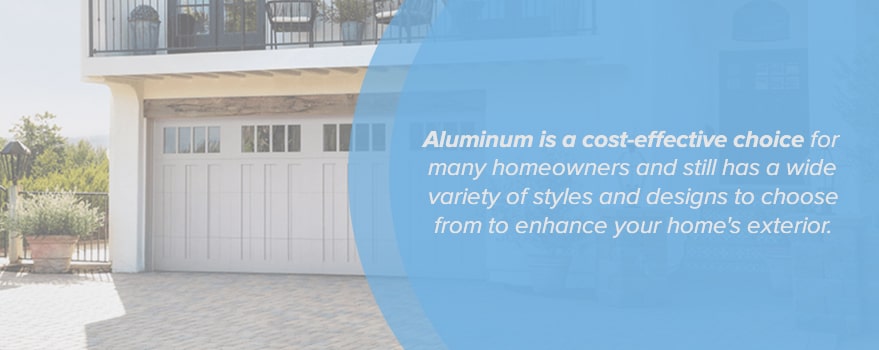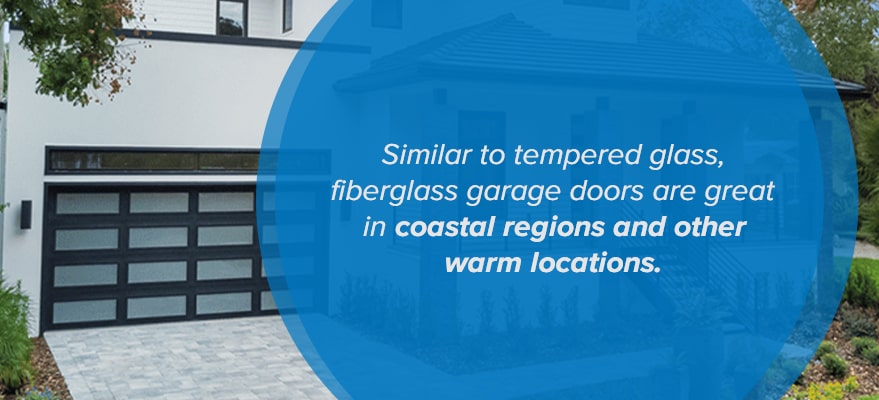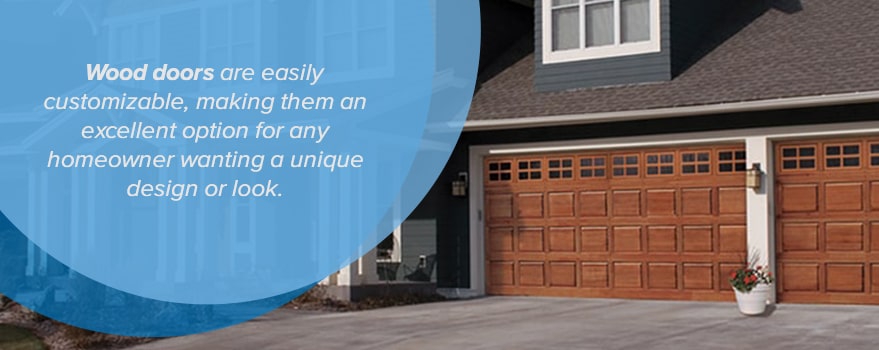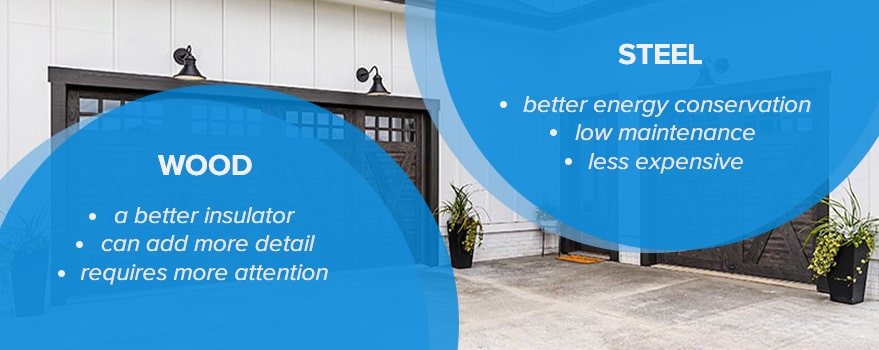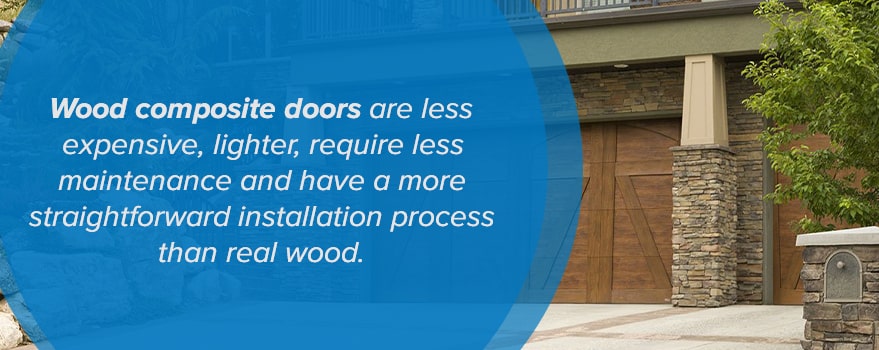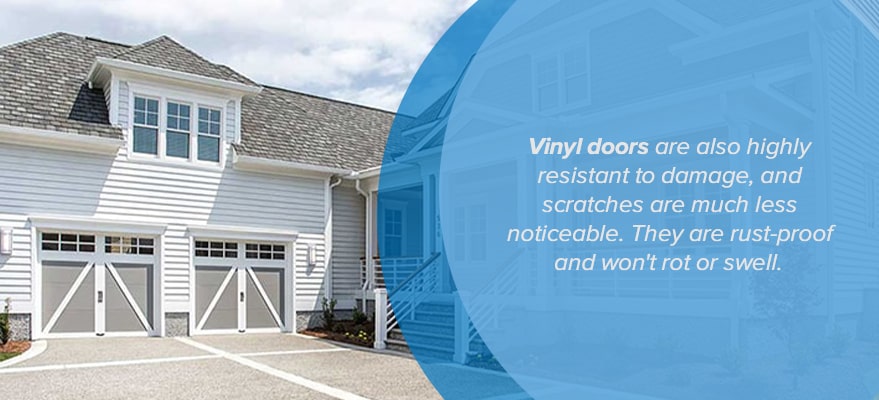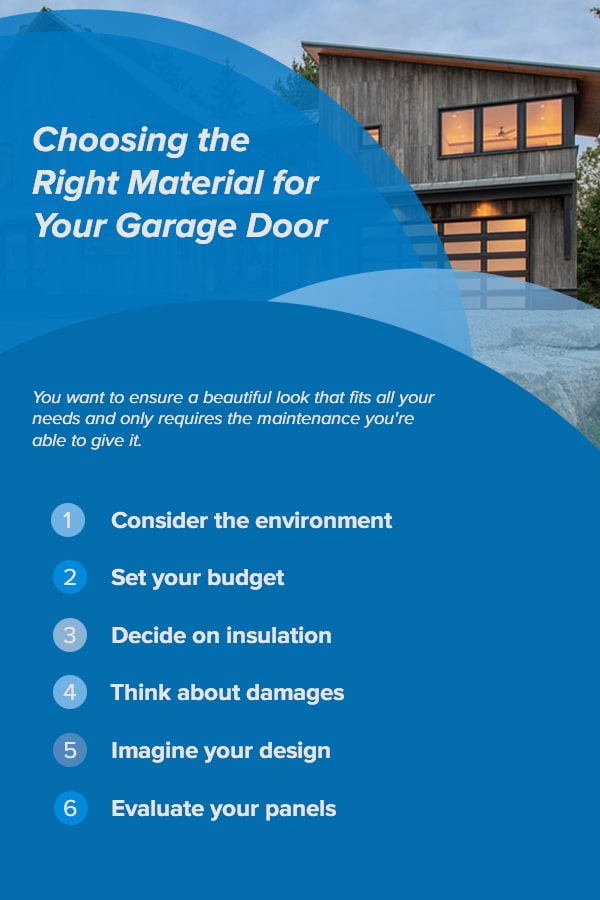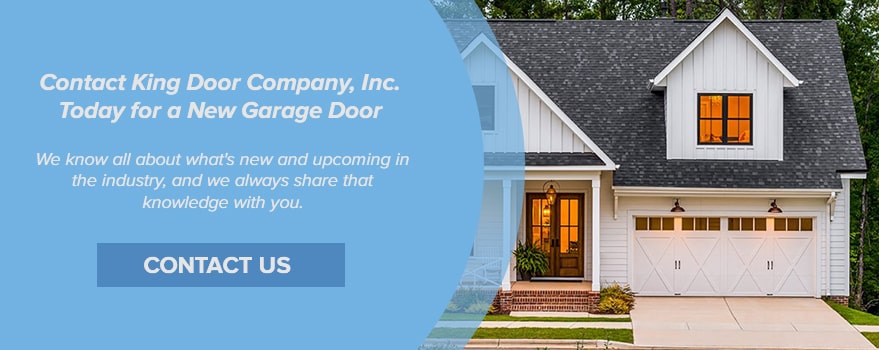Your garage door is a reflection of your lifestyle and preferences. Whether you prefer a look that’s vintage, rustic, traditional, modern or anything else, your garage door will enhance that appearance. Finding a door that achieves this requires determining what material is best for your garage doors.
If you’re wondering which type of garage door is best, we’ve compiled a guide to help answer that question. Our guide will discuss garage door materials’ pros and cons, show a garage door quality comparison and help you decide how to choose the one best suited for your lifestyle.
What Is the Most Common Material for Garage Doors?
Steel is the most popular choice of material for garage doors, but that doesn’t mean it’s the best type of garage door for every home. Steel is flexible and low maintenance compared to other materials, and it’s a low-cost option. You can style these doors to match your home’s exterior, and you can paint steel easily.
Aluminum is also a very popular choice and shares a lot of the same qualities as steel doors. Aluminum is lighter than steel, making aluminum doors less durable and easier to dent than steel doors. You still have plenty of style options available for aluminum, including faux wood texture and finish.
7 Common Garage Door Materials
Although steel and aluminum are the most popular choices, there are other garage door materials to make your door. Each type has pros and cons and will impact the look of your home.
1. Steel Garage Doors
Steel garage doors are the most popular choice right now. Steel doesn’t warp, dismantle or crack, even in harsh weather conditions, making it a very low-maintenance option. Despite its durability, steel can fall prey to corrosion and rust. You can use a coating to galvanize steel to aid against rusting, but this can be more expensive than untreated steel.
Furthermore, steel doors are not natural insulators, so you will need to invest in some insulation if you want a warm garage that doesn’t let a lot of sound out. Insulation can also help to strengthen your door, making it more resistant to dents.
Pros of steel garage doors:
- Plenty of styles to choose from
- Affordable option
- Durable and lightweight
- Performs well in all climates
Cons of steel garage doors:
- Subject to corrosion
- Not a source of insulation
- Not resistant to all dents
- Scratches can rust
Steel is a popular choice because of its versatility, durability and maintenance requirements. However, it’s not without its flaws. You may decide on other options that would better suit your lifestyle.
2. Aluminum Garage Doors
Aluminum is another popular choice for garage doors. It is a cost-effective choice for many homeowners and still has a wide variety of styles and designs to choose from to enhance your home’s exterior. It is resistant to natural damage such as rust and corrosion.
These doors are also known for their low R-value, which measures thermal efficiency. The R-value refers to how well insulation keeps warm air from escaping. High R-value materials can trap a lot of warm air, while low R-value materials allow heat to escape easily.
Pros of aluminum garage doors:
- Naturally resistant to corrosion and rust
- Very customizable
- Low maintenance
- Lightweight
Cons of aluminum garage doors:
- Not fully waterproof
- Low R-Value
- Becomes softer in heat
- Not as resistant to dents
These doors are worth considering for their customization availability, especially considering they are a less expensive option.
Steel vs. Aluminum Garage Doors
Between steel and aluminum, steel is the more durable option. Because aluminum is lighter than steel, it is also less impact resistant. However, aluminum is rust and corrosion resistant, while you need to monitor steel for these potential damages. Aluminum is also less expensive.
Neither metal is a natural insulator, so you can expect to need foam padding or something similar to keep your space warm. However, steel doors are easier to insulate. You can raise the R-value of your garage by adding insulation, but this is still something to consider when deciding what door will best suit your lifestyle.
3. Glass Garage Doors
Glass garage doors are unique, beautiful and safer than you might think.
Tempered glass is a form of safety glass. It has a much higher impact strength and can be found in bulletproof glass, car windows and shower doors. You can also get frosted or tinted options that block people from seeing inside your garage while still providing ample light to an otherwise dark space.
Although it does have a lower impact strength than metal or wood, tempered glass is safer than standard glass. When it shatters, the pieces are much smaller and less sharp, making it less likely to cause injuries.
Pros of glass garage doors:
- Creates a modern appearance
- Availability to customize
- Low maintenance
- Ample natural light
Cons of glass garage doors:
- Lower impact strength
- Can smudge and gather dirt
- Costly, depending on the manufacturing process
- Not a natural insulator
Glass garage doors can give your home an elegant and sophisticated look, but you have to clean them to get rid of dirt, smears and smudges. They are great for homes located in areas that don’t experience harsh winter conditions, such as coastal regions.
4. Fiberglass Garage Doors
Fiberglass garage doors are a small segment of the market. Fiberglass is a composite material, and it differs from tempered glass in its composition. You can use foam insulation to warm your garage and block street noise while still having various style options to match your exterior.
Fiberglass is also commonly used for entry doors. If you opt to coordinate your entry door and garage door, you can ensure an elegant curb appeal that is still functional.
Pros of fiberglass garage doors:
- Low maintenance
- Corrosion and rust-resistant
- Plenty of design options
- Doesn’t contract or expand due to temperatures
Cons of fiberglass garaged doors:
- Susceptible to wind damage
- Material underneath can yellow
- Wind can cause irritating noises
- Must be replaced if damaged
Similar to tempered glass, fiberglass garage doors are great in coastal regions and other warm locations. If you live somewhere that experiences harsh winter conditions or strong and frequent winds, other options may better suit your lifestyle.
Fiberglass vs. Steel Garage Doors
Fiberglass can insulate your garage much easier than steel, especially when you pair it with foam padding. However, if your garage door gets a lot of direct exposure from the sun, you’ll have to monitor your fiberglass door for signs of yellowing color or cracks with age. Furthermore, you cannot repair a fiberglass door. While you or a professional can fix minor damages in steel doors, you need to have a professional replace a fiberglass door when damaged.
Fiberglass won’t corrode or rust the way steel will, but it is more brittle. Due to its composition, fiberglass is much less resistant to dents and damage than steel. If you live in an area that does not experience harsh winds or severe rain, fiberglass is still a great option.
5. Wood Garage Doors
Wood garage doors are natural insulators that can accomplish a beautiful and rustic look. This type of garage door will give you a genuine, classic and authentic feel. These doors are easily customizable, making them an excellent option for any homeowner wanting a unique design or look.
The timeless look of these doors is not without its downsides. In wet climates, wood can become prone to rotting or warping. In some temperatures, wood also expands and contracts, which can cause your door to swell. Wooden garage doors need to be finished and maintained regularly. The cost of maintaining your door can quickly overstep the elegant beauty it brings to your home.
Pros of wood garage doors:
- Natural insulator
- Plenty of styles and designs
- Rustic and beautiful look
- Strong performance and rugged feel
Cons of wood garage doors:
- Heavier than other alternatives
- Needs to be maintained regularly
- Susceptible to warping, rotting or swelling
- Cracking finishes due to expanding and contracting
The first garage doors were made out of wood, and today these garages can give a traditional look to any home. Older homes and those with classic architecture can benefit from a beautiful rustic garage door. However, in areas prone to a lot of rain, other materials may be a more suitable option. Either way, you should expect to reseal, resand and repair your door every several years.
Wood vs. Steel Garage Doors
Steel has better energy conservation, but wood is a better insulator. Scratches and dents do not appear as clearly on wood doors as on other materials and metals. You can add more unique details to wood doors compared to steel. However, it costs more to produce wood doors because they cannot be crafted easily or quickly.
Another big difference between wood and steel doors is the level of maintenance required. Steel is relatively low maintenance, but you need to monitor it for rust and corrosion. On the other hand, wood can become prone to chipping, swelling, rotting and warping. You have to give wood doors more attention and be prepared to spend more on repairs and preventative damage measures.
6. Wood Composite Garage Doors
Wood composite is a blend of plastic, wood fiber and a binding agent. A composite garage door is a mixture of materials that can simulate natural wood. These doors are also referred to as faux wood garage doors. These doors are less expensive, lighter, require less maintenance and have a more straightforward installation process than real wood doors while still giving a beautiful look.
Many homeowners prefer real wood doors when their home faces the street to increase curb appeal and resale value. Although you may not see as many opportunities for customization in faux wood doors, you can use them to achieve a traditional or modern look, and you’ll receive them much sooner.
Pros of composite garage doors:
- Low maintenance
- Durable
- Great in any climate
- Easier installation than natural wood
Cons of composite garage doors:
- Heavy compared to other materials
- Doesn’t always precisely model natural wood
- Can crack after a while
- Paint can wear off
Wood composite doors are more durable than traditional wooden ones. They’re perfect in any climate because they are less susceptible to moisture, and the sun, wind and humidity won’t damage them. Although you may not see as many customization options compared to traditional wooden doors, you’ll receive your door sooner and feel secure in its performance for the years to come.
Metal vs. Wood Garage Doors
For the look of natural wood and the durability of a metal garage door, faux wood doors are a great middle ground. While real wood is susceptible to rotting, splitting and various other forms of natural damage, faux wood takes properties from its metal. Although you will experience different forms of age and wear, most of them are easier to fix. For example, rust is much easier to fix than rotting wood. You can usually sand other damages like scratches out of real wood doors, while those same damages in metal or composite doors will need repairs for the same issue.
Due to their composition, faux wood doors are heavier than other materials but lighter than real wood. Furthermore, the installation process for metal and composite doors is much more straightforward than for real wood, making the up-front cost much less. However, real wood is a natural insulator. If you want your garage to be warm, you’ll have to invest in some kind of insulation for a metal or composite door.
7. Vinyl Garage Doors
Vinyl is a synthetic plastic that can be made rigid or flexible. A vinyl garage door doesn’t contain any wood like a composite door. Vinyl doors are an excellent noise insulator, though they don’t insulate heat. They are also highly resistant to damage, and scratches are much less noticeable. They are rust-proof and won’t rot or swell.
Once you choose your vinyl color, there’s not much opportunity for change. Although you can paint it, it’s challenging to do so and is not typically recommended. They can also become brittle in colder temperatures, making them more likely to crack if impacted. However, they are an excellent choice for those in coastal regions because they are resistant to wind, sand and salt air. These doors typically have a finish that protects the door against UV rays, helping to keep the color from fading.
Some pros of vinyl garage doors:
- Resistant to splintering and splitting
- Durable
- Resistant to rust
- Low maintenance
Cons of vinyl garage doors:
- Difficult to be repainted
- Can crack upon impact in cold temperatures
- Not as many customization options
- Dark paint fades easier
A light-colored vinyl garage door can be great for those in coastal regions due to its ability to perform in humid locations. Although they are durable and a great investment, you can’t always get the exact look you want. If you want a dark color or prefer your door to look like wood, you may want to revisit the other options.
Steel vs. Vinyl Garage Doors
Steel is prone to dents and dings, but these damages are hardly noticeable on vinyl doors. Unlike steel, vinyl is also resistant to rust. Vinyl doors tend to be more expensive than steel doors. However, their ability to hold up against damages may save you money in the long run. Neither type is a natural insulator, so either option will require padding or something else to keep your garage warm, although vinyl is a good insulator for sound.
There are fewer customization options with vinyl compared to steel. While you can still customize your panels and windows, you only get one vinyl color, and you can’t accomplish a wood look with vinyl. Both types are lightweight and don’t require as much strain on your internal system.
Choosing the Right Material for Your Garage Door
By now, you probably see the appeal of several types of garage doors, but the best garage door is the one that best fits your lifestyle. You want to ensure a beautiful look that fits all your needs and only requires the maintenance you’re able to give it.
Here are the general topics you should think about for your garage door material comparison:
- Consider the environment: You want to first consider where you live. If you get a lot of rain, you’ll have to prepare for rust in steel doors and rotting in wood doors. Harsh winds can cause glass or fiberglass doors to rattle or crack.
- Set your budget: It’s a good idea to determine your price range early on in the process. Wood tends to be the most expensive material because they are not easy to make. If you want a wood look, set your sights on a composite or metal door that you can customize to look the way you want it.
- Decide on insulation: Wood is the only natural insulator. If you want a different material, you’ll need foam padding or some other form of insulation to keep your garage warm. Fiberglass and glass doors can brighten up your garage and, in turn, allow some light to warm up your space, but they may not be enough to match your needs.
- Think about damages: If you have children or neighbors who like to play outside, you should evaluate what kind of damages you might encounter and how you would fix them. On vinyl, scratches and dings are hardly noticeable. You can easily sand some damage out of wood. On metal or composite doors, even minor damages are apparent and will likely require repair.
- Imagine your design: You want your door to be functional and beautiful. You might love the durability of vinyl, but if you don’t like the color options, you should keep looking for that perfect door. Furthermore, if you love the natural wood look but can’t keep up on the repairs, you may want to consider a wood composite door.
- Evaluate your panels: Going hand-in-hand with your design, you want to consider whether you want a single panel or a sectional garage. There are multiple types of sectional garage doors. However, older homes are typically better suited for single-panel doors. If you have a traditional home, you may want to opt for a wood or wood composite single-panel door rather than a metal sectional door.
If you’re still unsure what door is best for you, consult a professional who will be able to ask you questions about your day-to-day life that may impact what door type is ideal. They’ll also remind you of the pros and cons of the options you’re considering and offer insight you may not have considered. Choosing the perfect garage door can be simple and easy with the right help.
Contact King Door Company, Inc. Today for a New Garage Door
King Door Company, Inc. has been in business since 1985 and operating for over 35 years. We know all about what’s new and upcoming in the industry, and we always share that knowledge with you. We work with the pride of a lion to ensure you get outstanding service while only using materials and products backed by proven manufacturers to ensure top-quality installation.
Our team is proud of the service and quality we offer. We offer same-day service and 24-hour emergency repair. Our team can complete most of our services on the same day because we value your time. Our technicians are highly-trained professionals who will always show up with everything they need for your service.
Contact us to schedule your garage door installation and let us transform your home.

